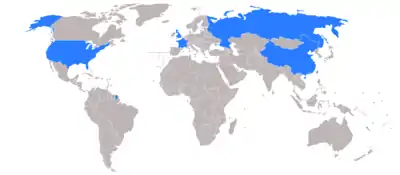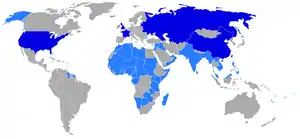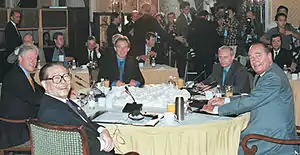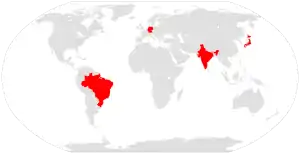Permanent members of the United Nations Security Council
The permanent members of the United Nations Security Council (also known as the Permanent Five, Big Five, or P5) are the five sovereign states to whom the UN Charter of 1945 grants a permanent seat on the UN Security Council: China, France, Russia[1][lower-alpha 1][2][lower-alpha 2][3][lower-alpha 3], the United Kingdom, and the United States.[4][5]

The permanent members were all allies in World War II (and the victors of that war), and are all states with nuclear weapons. All have the power of veto which enables any one of them to prevent the adoption of any "substantive" draft Council resolution, regardless of its level of international support.[6] The remaining 10 members of the UN Security Council are elected by the General Assembly, giving a total of 15 UN member states.
Permanent members
The following is a table of the current permanent members of the U.N. Security Council.
| Country | Current state representation | Former state representation | Current executive leaders | Current representative |
|---|---|---|---|---|
| China | Republic of China[lower-alpha 4] (1945–1971) | General Secretary and President: Xi Jinping[lower-alpha 5] Premier of the State Council: Li Keqiang[lower-alpha 6] |
Zhang Jun[7] | |
| France | Provisional Government of the French Republic (1945–1946) French Fourth Republic (1946–1958) |
President: Emmanuel Macron Prime Minister: Élisabeth Borne |
Nicolas de Rivière[8] | |
| Russia | Union of Soviet Socialist Republics (1945–1991) | President: Vladimir Putin Chairman of the Government: Mikhail Mishustin |
Vasily Nebenzya[9] | |
| United Kingdom | — | Monarch: Charles III Prime Minister: Rishi Sunak |
Barbara Woodward[10] | |
| United States | — | President: Joe Biden | Linda Thomas-Greenfield[11] |
History


At the UN's founding in 1945, the five permanent members of the Security Council were the French Republic, the Republic of China, the Soviet Union, the United Kingdom, and the United States. There have been two seat changes since then, although these have not been reflected in Article 23 of the United Nations Charter, as it has not been accordingly amended:
- China's seat was originally held by the Nationalist government of the Republic of China (ROC). However, it lost the Chinese Civil War and retreated to the island of Taiwan in 1949. The Chinese Communist Party won control of mainland China and established the People's Republic of China (PRC). In 1971, UN General Assembly Resolution 2758 recognised the PRC as the legal representative of China in the UN, and gave it the seat on the Security Council that had been held by the ROC, which was expelled from the UN altogether.[12] Both the ROC and the PRC continue to claim de jure sovereignty over the entirety of China (including Taiwan).[13][14][15] However, only 14 states continue to officially recognise the ROC as the sole legitimate government of China.
- After the dissolution of the Soviet Union in 1991, Russia was recognised as the legal successor state of the Soviet Union and maintained the latter's position on the Security Council.[16][17][18][19]
Additionally, France reformed its provisional government into the French Fourth Republic in 1946 and later into the French Fifth Republic in 1958, both under the leadership of Charles de Gaulle. France maintained its seat as there was no change in its international status or recognition, although many of its overseas possessions eventually became independent.
The five permanent members of the Security Council were the victorious powers in World War II and have maintained the world's most powerful military forces ever since. They annually top the list of countries with the highest military expenditures along with India and Germany; in 2011, they spent over US$1 trillion combined on defence, accounting for over 60% of global military expenditures (the U.S. alone accounting for over 40%). They are also among the world's top 10 largest arms exporters and are the only nations officially recognised as "nuclear-weapon states" under the Treaty on the Non-Proliferation of Nuclear Weapons (NPT), though there are other states known or believed to be in possession of nuclear weapons.
Veto power
The "power of veto" refers to the veto power wielded solely by the permanent members, enabling them to prevent the adoption of any "substantive" draft Council resolution, regardless of the level of international support for the draft. The veto does not apply to procedural votes, which is significant in that the Security Council's permanent membership can vote against a "procedural" draft resolution, without necessarily blocking its adoption by the council.
The veto is exercised when any permanent member—the so-called "P5" casts a "negative" vote on a "substantive" draft resolution. Abstention or absence from the vote by a permanent member does not prevent a draft resolution from being adopted.
Expansion
There have been proposals suggesting the introduction of new permanent members. The candidates usually mentioned are Brazil, Germany, India, and Japan. They compose the group of four countries known as the G4 nations, which mutually support one another's bids for permanent seats.[20]
This sort of reform has traditionally been opposed by the Uniting for Consensus group, which is composed primarily of nations that are regional rivals and economic competitors of the G4. The group is composed of Italy and Spain (opposing Germany), Mexico, Colombia, and Argentina (opposing Brazil), Pakistan (opposing India), and South Korea (opposing Japan), in addition to Turkey, Indonesia and others. Since 1992, Italy and other council members have instead proposed semi-permanent seats or expanding the number of temporary seats.[21]
Most of the leading candidates for permanent membership are regularly elected onto the Security Council by their respective groups. Japan was elected for eleven two-year terms, Brazil for ten terms, and Germany for three terms. India has been elected to the council eight times in total, with the most recent successful bid being in 2020.
In 2013, the P5 and G4 members of the UN Security Council accounted for eight of the world's ten largest defence budgets, according to the Stockholm International Peace Research Institute (SIPRI).
Leaders of the permanent members
The following are the heads of state or heads of government that represent the permanent members of the UN Security Council as of 2022:

.jpg.webp)
.jpg.webp)
.jpg.webp) Rishi Sunak
Rishi Sunak
Prime Minister of the
United Kingdom
of Great Britain and Northern Ireland
since 25 October 2022.jpg.webp)
Historical leaders

See also
- List of country groupings
Notes
- "the Russian Federation took over the membership of the Soviet Union after dissolution."
- "The permanent members of the United Nations Security Council are the five states which the UN Charter of 1945 grants a permanent seat on the UN Security Council: China, France, Russian Federation, United Kingdom, United States."
- "The conclusion arrived at in the previous section – if adhered to – might have also brought about the elimination of Soviet (and subsequently Russian) permanent membership in the UN Security Council. Such an outcome would have clearly precipitated a serious constitutional crisis for the United Nations: the resulting situation would have violated the explicit provisions of Article 23(1) of the UN Charter, as amended, under which the Council should consist of five permanent and ten non-permanent members. It is reasonable to assume that considerations of this nature played a major role in prompting the Secretary-General and the UN membership to accede to Russia’s claim – however flawed legally – to be the ‘continuation’ of the Soviet Union. Once this claim was accepted, it followed logically that the Soviet permanent seat in the Security Council also belonged to Russia. It is of course true that Article 23(1) designates the five permanent members of the Council (including ‘the Union of Soviet Socialist Republics’) by name. But here, again, it would be absurd to assume that a mere change in the name of a permanent member could bring about the termination of its seat in the Council. This provision of Article 23(1) must thus be read as referring to the names of the permanent members at the time of the Charter’s adoption and subject to subsequent name changes. This, in fact, was the practice adopted by the United Nations in 1971 when the ‘People’s Republic of China’ replaced the ‘Republic of China’ (another permanent member of the Security Council). Amendment of the list of names contained in Article 23(1) was deemed unnecessary."
- On 25 October 1971, with opposition from the United States, the mainland communist People's Republic of China was given the Chinese seat on the Security Council in place of the Republic of China (Taiwan).
- The President of China is legally a ceremonial office, but the General Secretary of the Chinese Communist Party (de facto leader) has always held this office since 1993, except for the months of transition. The current paramount leader is President Xi Jinping.
- The de jure head of government of China is the Premier of the State Council, whose current holder is Li Keqiang.
- General Secretary of the Chinese Communist Party since 15 November 2012 and President of China since 14 March 2013
- Previously President of Russia in 2000–08
References
- The Five Permanent Members Of The UN Security Council. WorldAtlas.com Accessed 1 March 2022. Archived.
- Permanent Members of the United Nations Security Council. Security Council Report. Accessed 1 March 2022. Archived.
- Russia Takes Over the Soviet Union's Seat at the United Nations. Yehuda Z. Blum. Kaleidoscope. European Journal of International Law. Volume 3, Issue 2, 1992, p.360. 1 August 1992. Accessed 1 March 2022. Archived.
- "United Nations Charter (full text)". United Nations. Retrieved 28 February 2022.
- "Security Council Members | United Nations Security Council". www.un.org. Retrieved 21 March 2020.
- [1] Archived 20 June 2012 at the Wayback Machine
- "Ambassador Zhang Jun, PR". chnun.chinamission.org.cn. Retrieved 6 May 2020.
- "Nicolas de Rivière". France ONU. Retrieved 6 May 2020.
- "Постоянное представительство Российской Федерации при ООН". russiaun.ru. Retrieved 6 May 2020.
- "Barbara Woodward DCMG". GOV.UK. Retrieved 9 December 2020.
- "Ambassador Linda Thomas-Greenfield". usun.usmission.gov. Retrieved 26 February 2021.
- Froehlich, Annette; Seffinga, Vincent (2019). The United Nations and Space Security: Conflicting Mandates between UNCOPUOS and the CD. p. 40. ISBN 978-3-030-06025-1.
- Sarmento, Clara (2009). Eastwards / Westwards: Which Direction for Gender Studies in the 21st Century?. p. 127. ISBN 978-1-4438-0868-2.
- Hudson, Christopher (2014). The China Handbook. p. 59. ISBN 978-1-134-26966-2.
- Rigger, Shelley (2002). Politics in Taiwan: Voting for Reform. p. 60. ISBN 978-1-134-69297-2.
- Blum, Yehuda Z. (1992). "Russia Takes Over the Soviet Union's Seat at the United Nations" (PDF). European Journal of International Law. 3 (2): 354–362. doi:10.1093/ejil/3.2.354. Retrieved 20 October 2022.
- MacLeod, Andrew (24 February 2022). "Ukraine invasion: Should Russia lose its seat on the UN Security Council?". The Conversation.
- MacLeod, Andrew (25 February 2022). "Ukraine invasion: Should Russia lose its seat on the UN Security Council?". King's College London.
- Menon, Kiran Mohandas (7 March 2022). "How did Russia get USSR's permanent seat on UN Security Council?". RTÉ.ie.
- Sharma, Rajeev (27 September 2015). "India pushes the envelope at G4 Summit: PM Modi tells UNSC to make space for largest democracies". First Post. Retrieved 20 October 2015.
- "Italy Accuses G4 of Foul Play | DW | 27 July 2005". Deutsche Welle.
Further reading
- Nico J. Schrijver and Niels M. Blokker (eds.). 2020. Elected Members of the Security Council: Lame Ducks or Key Players? Brill.com.
- GPF Staff (April 2005). "Security Council Expansion—A Regional Model" (PDF). GlobalPolicy.org. Global Policy Forum. Archived from the original (PDF) on 19 May 2009. This is referred to by some as the "Italian Model".
